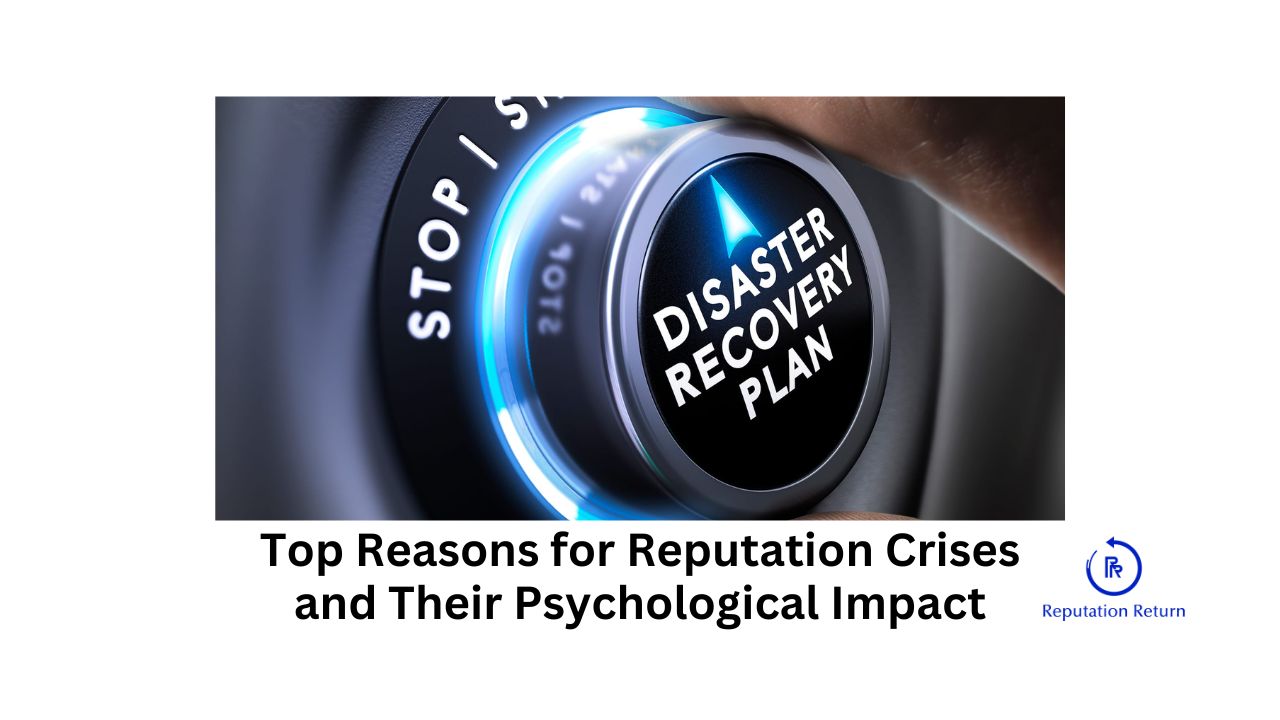A reputation crisis can strike individuals or companies at any time, often with devastating consequences. These are the top reasons why such crises occur and how they can affect mental health. In the conclusion, we’ll explore how Reputation Return, a leading online reputation management (ORM) company, can help mitigate these issues.
Reasons for Reputation Crises
- Negative Online Reviews:
- Impact: For businesses, a series of bad reviews can erode consumer trust and drive potential customers away. For individuals, negative comments can tarnish personal or professional reputations.
- Example: A restaurant receiving multiple poor reviews on Yelp may see a significant drop in patronage, directly affecting its revenue.
- Social Media Blunders:
- Impact: Missteps on social media platforms, such as inappropriate comments or insensitive posts, can quickly go viral, leading to public outrage.
- Example: A CEO’s offensive tweet can lead to widespread calls for boycotts and resignations.
- Legal Issues:
- Impact: Publicized legal problems, whether criminal charges or civil lawsuits, can severely damage credibility and trust.
- Example: A company’s involvement in a fraud case can lead to loss of investors and customers. Learn how we can suppress and/or remove legal listings/documents/links online.
- Data Breaches:
- Impact: Exposing customer or client data can lead to mistrust and potential legal action.
- Example: A healthcare provider’s data breach could expose sensitive patient information, leading to loss of patient trust and potential lawsuits.
- False Accusations and Defamation:
- Impact: Baseless claims and defamatory statements can spread rapidly online, causing unjust damage.
- Example: A competitor spreading false rumors about a business’s unethical practices can lead to a significant drop in sales.
- Poor Customer Service:
- Impact: Repeated instances of poor customer service can result in negative word-of-mouth and online backlash.
- Example: A telecom company consistently receiving complaints about service outages and unhelpful support can see its customer base shrink.
- Unethical Behavior:
- Impact: Discoveries of unethical practices, such as discrimination or environmental violations, can lead to boycotts and legal consequences.
- Example: A fashion brand exposed for using child labor can face global consumer boycotts and a damaged brand image.
Psychological Damage from Reputation Crises
Experiencing a reputation crisis can have severe psychological impacts, including:
- Stress and Anxiety:
- Constant worry about the fallout from negative publicity can lead to chronic stress and anxiety. Individuals may fear further damage to their reputation, leading to sleepless nights and a perpetual state of worry.
- Depression:
- Persistent negative attention can result in feelings of hopelessness and depression. The loss of respect and trust from peers, clients, or the public can diminish self-esteem and lead to depressive episodes.
- Isolation:
- To avoid judgment or harassment, individuals may withdraw from social interactions, leading to isolation and loneliness. The fear of encountering negative reactions can make them avoid both online and offline engagements.
- Anger and Frustration:
- The feeling of being unfairly targeted or misunderstood can result in anger and frustration. This emotional turmoil can strain personal relationships and professional interactions.
- Impaired Performance:
- The mental burden of dealing with a reputation crisis can impair professional performance and decision-making abilities. The constant distraction and preoccupation with the crisis can lead to decreased productivity and effectiveness.
How Reputation Return Can Help
Reputation Return specializes in mitigating the effects of reputation crises and restoring a positive online presence. Here’s how we can help:
- Monitoring and Analysis:
- Reputation Return continuously monitors online mentions and reviews to detect potential threats early. By analyzing trends and identifying negative content promptly, they can prevent minor issues from escalating.
- Content Removal and Suppression:
- They work to remove or suppress harmful content from search results. This includes negotiating with website owners, leveraging legal tools like the DMCA, and employing SEO strategies to push negative content lower in search rankings.
- Positive Content Promotion:
- Reputation Return creates and promotes positive content to overshadow negative mentions. By generating favorable articles, blog posts, and social media content, they enhance the positive perception of their clients.
- SEO Optimization:
- They optimize clients’ online profiles and websites to improve search engine rankings for positive content. This makes it easier for potential customers or employers to find the good rather than the bad.
- Review Management:
- Reputation Return helps manage and improve online reviews by encouraging satisfied customers to leave positive feedback. They also provide strategies for responding professionally to negative reviews to mitigate their impact.
- Ongoing Support:
- They offer continuous support to maintain a strong, positive online presence. This includes regular updates, new content creation, and strategic advice to adapt to changing online landscapes.
By partnering with Reputation Return, individuals and businesses can reduce stress, restore their reputation, and focus on growth and success. With their comprehensive and strategic approach, Reputation Return ensures that your online reputation is protected and enhanced, allowing you to move forward with confidence.

